In the UK, demand for virtualisation services has gone mainstream, with nearly two-thirds of UK enterprises either being in the planning stages or already deploying virtualised enterprise applications, according to a new report commissioned by Ciena and conducted by Opinion Matters.
The survey asked 252 British IT decision makers about their plans to deploy virtualised applications, such as software-based managed services like routers, encryption, firewalls and WAN optimisation – services that have traditionally been based on dedicated hardware.
Network functions virtualisation (NFV) poses significant opportunities to help businesses keep up with constantly changing IT and networking requirements. Software-defined managed services, such as that recently launched by CenturyLink, for example, illustrates the momentum building in this area (CenturyLink launches fully managed SD-WAN service).
Commenting on the survey, Joe Marsella, CTO EMEA, at Ciena, said: ‘Software and virtualisation, combined with new DevOps style approaches, are key components for flexible and adaptive ICT – and also essential to establish a more agile business culture. By enhancing services with virtual applications that appeal to enterprises, improve service velocity and incorporate the flexibility needed to build, trial and release applications more rapidly, service providers will strengthen their ability to compete in today’s challenging business environment.’
The study assessed the investment plans and views of enterprises around virtualised service delivery and their key decision factors when selecting vendors and managed service providers to implement these technologies.
Almost all (93 per cent) British businesses say they would prefer to choose best-of-breed, interoperable virtual services and partners, allowing them to build and adapt their networks for specific customer needs. This highlights the need for open, multi-vendor, multi-domain environments and ecosystem partnerships rather than single-vendor solutions.
Speed of new service deployment was flagged as very important by 41 per cent of respondents, while more, 49 per cent, highlighted the importance of virtualised applications to support rapid expansion of company IT infrastructure to new business units, partners and branches. This is in line with the drive to a DevOps-style approach to help modify new services and add new resources more quickly and easily.
When selecting network function virtualisation (NFV) solutions or virtualised enterprise applications, 56 per cent of respondents prefer working with established, major IT vendors such as Adobe and Oracle, followed by their existing connectivity service providers (37 per cent).
Why the interest? More than half of businesses surveyed (52 per cent) are looking to lower the total cost of ownership (TCO) when moving to virtual platforms, and a similar number (54 per cent) consider the shift from a capital expenditure to an operational expenditure to be highly important.
However, ‘bill shock’ – the potential for run-away and unexpected costs resulting from an unplanned increase in the use of on-demand virtual services – is a significant concern. More than one third (37 per cent) of respondents still want a fixed monthly contract or a flat annual fee (34 per cent) to insulate them from the costs of a demand spike.
The independent blind study was conducted by Opinion Matters among 252 UK IT decision makers, including 126 networking and communications decision makers across the IT and telecoms, finance, retail, healthcare, construction, manufacturing and utilities industries with a turnover of more than £2 million.

